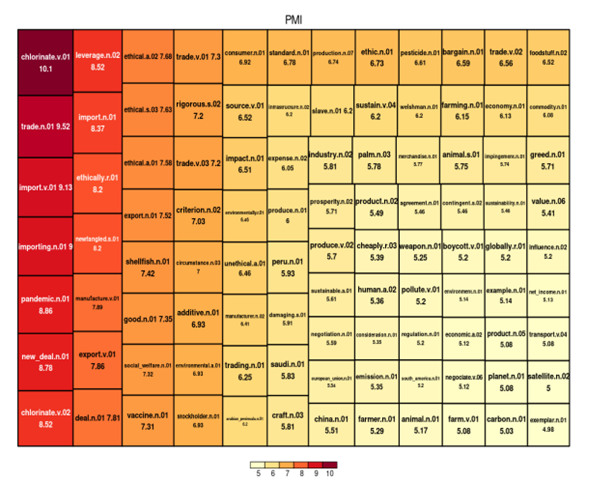What can a conceptual analysis tell us about public attitudes to post-Brexit trade?
by Rhys Sandow
Concept Analytics Lab were commissioned by the Prevention Research Partnership (PETRA) to investigate the attitudes towards trade expressed in responses to the Mass Observation Project’s 2021 UK Trade Policy directive. PETRA is a network of cross-disciplinary academics and other experts from NGOs and charities who are united by their goal of determining how trade agreements can be used to prevent disease and improve health. The long-form narratives from the general public gathered by the Mass Observation’s Trade Policy directive on the topic of trade deals that are unparalleled in scope.
Here at Concepts Analytics Lab, we employed both established and bespoke computational linguistic tools to extract key themes (concepts) in the data and then conducted corpus analysis to provide a close reading of these salient topics. Our analysis, which comprises 125 responses to the directive, totalling 56,840 words, identified the top 100 concepts that are characteristic of the Trade directive (its conceptual fingerprint, see Figure 1).

Using these key concepts as our starting point, we conducted corpus analysis, from which we identified a range of themes in relation to trade policy including:
- Ethical concerns
- Human rights issues in China
- Environmental impact of long-distance trade
- Animal welfare in the USA and Australia
- Likelihood of standard to decrease post-Brexit
- A desire for health and environment to be priorities in any future trade deal
- A perception that EU standards are world-leading
- Leaving the EU is an opportunity to support local produce to a greater extent
- A belief that trade deals will not impact individuals or their local communities
- A belief that while environmental concerns were a priority for respondents, the government’s key concerns were financial
A general acknowledgement of a lack of awareness of the intricacies of trade agreements
The findings bear impact on our understanding of i) the public’s attitude towards trade agreements and how these vary between countries, ii) the disconnect between what the public want from a trade deal and the perceived agenda of the UK government, and iii) the value of clear communication between policy makers and the general public about trade deals and their implications. On a more methodological level, we showcase the value of employing a dual approach of conceptual and corpus analysis to provide an overview of key themes within a data set as well as a more detailed and contextualised investigation of stances and attitudes expressed in relation to these topics. But, most importantly, this research impacts the PETRA network in their research and shaping trade-related public policy in the UK.
For a more detailed account of our findings, you can read our full report here.
About Us
We identify conceptual patterns and change in human thought through a combination of distant text reading and corpus linguistics techniques.

